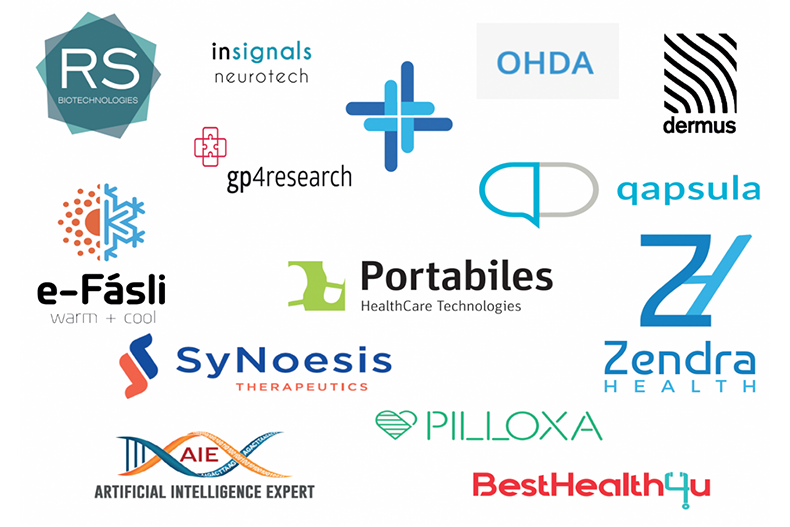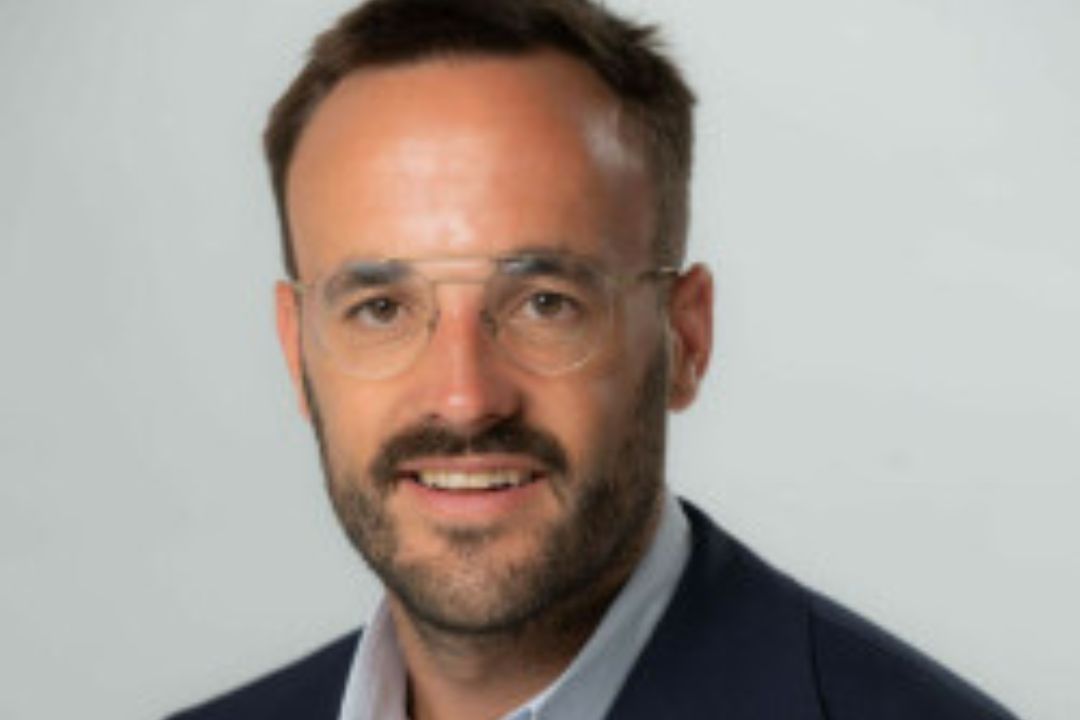17th July 2019
Register to attend the event
Fourteen start-ups will showcase the solutions they have developed in the course of the inaugural version of the EIT Health Start-Ups Meet Pharma Programme during a Demo Day on 26 July 2019 in Heidelberg, Germany.
Those wishing to learn more about the start-ups, which are described below, are invited to register and attend the event. The demonstration day is the last module of the EIT Health Start-Ups Meet Pharma Programme for 2019. Before making these presentations, the start-ups were involved in more than 20 workshops, as well as visits with EIT Health Pharma partners.
During the programme, start-ups developed solutions to five different challenges set by EIT Health Pharma Partners Amgen, Bayer, Ferrer, Janssen and UCB. The challenges were:

- Providing the right diagnosis at the right point in time – Rheumatoid Arthritis (Partner: Amgen).
- Telemedicine based patient support program in women’s health, cardiology, oncology, hematology, ophthalmology, pulmonology (Partner: Bayer AG).
- Parkinson’s Disease – How to improve the management of “wearing-off” motor episodes(dyskinesias, dystonias); including freezing episodes (Partner: Ferrer).
4. Creating a Biomarker Measurement Platform: Disease agnostic but focusing on disease prevention and interception with positive and negative prediction models (Partner: Johnson & Johnson World Without Disease).
5. The measurement of skin health in the assessment of treatment efficacy and ability to predict flares for conditions such as atopic dermatitis and chronic spontaneous urticaria (Partner: UCB).
Meet the start-ups
The 14 presenting start-ups come from all over Europe and were chosen out of nearly 100 applicants:
aiOmics: An AI platform was used to develop the best non-invasive multi-cancer diagnostic and early detection test (99% accuracy for 11 type of cancers). The aiOmics innovation implements the following vision: Omics data are Big Data in terms of the number of molecular inputs, and the diagnostic, prognostic and response to treatment are Data Science problems, mainly classifications (e.g., diagnostic, prognostics, etc.) or regressions (e.g., survival, relapse, etc.).
Thus, the platform is not only disease agnostic, but also groups many medical problems in one of the two classes. The aiOmics solution uses an innovative approach for various omics data integration, in order to not aggravate the disproportion between the number of inputs and cases.
Bio2Skin (BestHealth4U): Developing and bringing to the market a new generation of medical-grade adhesives. Bio2Skin is a revolutionary nano-based adhesive for medical applications that can be integrated into a wide range of medical devices. It is based on a patented-pending technology that avoids skin injury in prolonged use or upon removal. It is ideal for general use and can provide effective protection against Medical Adhesive-Related Skin Injury (MARSI) in long-term applications such as ostomy, elderly and neo-natal patients.
CalmSkin (Dermus Kft): Develops a portable ultrasound device that sees under the surface of the skin to help diagnose and predict inflammatory skin disorders. Inflammatory skin disorders are a source of distress to around a fifth of the population in the world, many of them children. Flareups can occur without warning and there is a lack of objective evaluation of disease severity (the widely used SCORAD system is based on subjective patient scores). The development of decentralised trials of new medicines would require a cost-effective, portable and objective scoring system. Furthermore, once the medicine is developed, digital health solutions are needed to predict flareups and guide optimal treatment for best patient outcome. CalmSkin’s solution can help.
DB Health (Reverse Biotechnologies): Develops a biomarker platform to help medical staff in managing diagnostic tools, so they can follow a faster and more precise diagnostic pathway. The start-up intends to facilitate a safe diagnosis for the patient by guiding the search for facilities that perform the right biomarker validations analysis. The platform is associated to a database that incorporates biomarkers related to geriatric diseases with information regarding type of disease, disease stage, symptoms, type of the analysis and data on the laboratory performing the analysis. An algorithm and easy-to-use interface will offer the possibility to medical personnel to efficiently navigate and to choose the best diagnosis pathway.
e-Fasli: The only fine-controlled thermotherapeutic device, it can keep the temperature of the skin and the sick body part at a constant temperature, between 25 and 45 C, for hours. It is wearable and comfortable, with various sizes and shapes for peripherals. Using a wi-fi network and server-side Big Data analysis, it personalises therapy. For new users, it suggests a near-to-optimal treatment based on data of similar previous patients. The device learns the specificity of the user, and builds strategies for each symptom. It can distinguish between short-term (symptomatic) and the long-term (therapeutic) effects.
GP4Research: A patient-centred company that develops a Primary Care Practice-Based Research Network (GP4R PBRN) to improve patient access to clinical trials. Embedding Clinical Trials into primary care supported with telemedicine, we bring trials directly to patients. We focus on patients’ comfort by conducting studies in familiar environment close to their home and primary care physician. GP4R PBRN plans to allow research activities to involve 300-500 primary Central and Eastern European care practices, with access to five million people.
Clinical trials will be executed through GPs and nurses supported with telemedicine solutions. The network will operate dedicated software supporting recruitment, process management and data monitoring. The start-up intends to facilitate GP practices with standardised telemedicine kiosks, allowing external investigators to conduct remote visits so patients don’t have to travel to the research site. By expanding geographical reach of traditional research sites, the solution provides access to a new pool of patients.
InSignals (Neurotech): Developing medical devices to support an objective evaluation of motor symptoms of neurological diseases, such as Parkinson’s disease. In Parkinson’s disease, the quantification of motor signs is fundamental. iHandU consists of a non-invasive wearable hand device that is ergonomically suited to the patient’s hand to evaluate wrist rigidity effectively. Our machine learning algorithms process data related to rigidity and dynamic tremor, providing the physicians with real-time information.
iHandU has been clinically tested in more than 70 PD patients submitted to DBS surgery at the S. João University Hospital, Porto, Portugal, showing more than 84% accuracy. New clinical trials are currently being establish in the UK, Germany and the Netherlands, to complement the data pack of the benefits in treating Parkinson’s disease and other neurological diseases.
NOVA: A WhatsApp-like chatbot that has been developed to empower families and individuals suffering from atopic dermatitis. Nova’s aim is to help them lead better lives by integrating them into the treatment process through daily conversations and AI-based recommendations. Nova not only helps to find the highly personal treatment-plan much faster, to help a patient keep the atopic dermatitis in check – it also helps doctors and insurers save a significant amount of time and money.
Nova intends to save a lot of time by enabling affected people and their relatives to: (a) self-educate through a highly personalised curriculum provided by subject matter experts; (b) learn about certain flare-up triggers themselves through smart tracking and analytics; (c) change certain habits (e.g. better medication adherence) through a gamification approach, including nudges and challenges.
OHDA: The company aims to become a medical service integrator and to build a patient-centred, transaction-based telemedicine service platform for all diagnostic needs and stakeholders of healthcare delivery networks. In the current project, special focus was laid on women’s diagnostic and treatment patterns. While women’s health is an adequately addressed concept within applied medical sciences, when it comes to actual diagnosis and treatment, it is lacking the desired patient centred work flow management and the dedicated technical infrastructure.
Providing women with the right amount of timely information on their own health status can build confidence and trust in upcoming and inevitable treatment. Such a state of awareness also brings beneficial and improved psychological conditions helping patients to more easily cope with their illness.
Pilloxa: A Swedish digital health company that has developed a patient-centric adherence platform to solve the underlying factors that cause patients to not take medication as prescribed. In 2015 Pilloxa did hundreds of interviews with patients, relatives and HCPs to understand the underlying factors to poor adherence. Some 50% of the patients do not take their medication as prescribed, and 60 % of the patients can not repeat the instructions that their HCP gave them at their last visit. The result is that around 10% of all hospitalisations in Sweden are due to poor adherence to medication.
Pilloxa’s first product is a smart pillbox with embedded sensors that is connected to a smartphone application. Functionalities onwards include getting reminded only when the patient has forgotten, the ability to note how you feel, and potential side effects. Based on this data, Pilloxa can give tailored interventions in the app such as self-education and recommendation to book an online appointment.
Portabiles Healthcare Technologies: In Parkinson’s disease, reduced ability to walk is the most restricting symptom, concerning 7 million patients worldwide. More than 60% of Parkinson’s patients suffer from cyclic changes – switching from inability to move to uncontrollable movements. These motor fluctuations are complex, resulting in frequent hospitalisation when poorly cared for and causing direct costs of €6 billion in industrial nations with 2.5 million Parkinson’s patients.
Portabiles Health Care Technologies developed Mobile GaitLab, a medical gait analysis for better diagnosis and therapy of Parkinson’s patients. Mobile GaitLab consists of sensors integrated into orthopedic shoes, meant to be continuously worn by patients at home, combined with a specially developed app for self-assessment. It is used within a personalised care concept for clinical decision support. The physician and a supporting tele-nurse receive a daily report about timing and severity of the motor fluctuations and the self-assessment. System and algorithms are validated by more than 2 000 clinically stratified gait analyses.
Qapsula: A solution to increase patients’ compliance with therapy and adherence to treatment. The start-up provides an interactive personal assistant that helps people manage their health more effectively by providing them with personal medical recommendations, monitoring health status, involving patients in the treatment process and connecting them with doctors and coaches. The system consists of various functional blocks that can be combined in different ways, depending on the disease or use case, to help increase the effectiveness of prevention and treatment.
Synosesis Therapeutics: A biotech start-up with the vision to cure Parkinson’s disease (PD) and other major brain diseases. The start-up aims to capitalize on the potential of a new therapeutic it patented for PD to be further developed to be successful in clinical trials and become the first drug to cure it. The therapeutic has a pleiotropic both disease-modifying and symptomatic effect. It covers remarkably the major unmet needs of PD in several mouse models and has drug-like properties.
SyNoesis has achieved several lines of validation so far, the most important of which is the 1st Prize at the EIT HEALTH Catapult for 2018 and the Seal of Excellence for the H2020 SME Instrument.
Zendra Health: A Dublin-based Digital Health company whose aim is to improve people’s lives and accelerate research into chronic conditions through technology. Zendra Health have used their vast experience in building Digital Health solutions for world-renowned healthcare institutions to develop a platform that provides building blocks to enable healthcare professionals to build evidence-based Digital Health solutions at an 80% reduction in both cost and time-to-market.
Find out more and join us
- Please contact Matteo Consonni (matteo.consonni@eithealth.eu) or Barbara Costa (barbara.costa@eithealth.eu) if you would like to find out more about this programme, and/or would like to sponsor a challenge in future years.
Europe's top health start-ups take centre stage: EIT Health Catapult winners are revealed at HLTH Europe

2025 Catapult programme winners announced.
Finding Europe’s next healthtech leaders: Insights from Antoine D’Hollander

Insights from Antoine D’Hollander, Capricorn Partners.
EIT Health supports 17 promising deep tech start-ups bridge the ‘Valley of Death’

Providing start-ups with the right support.